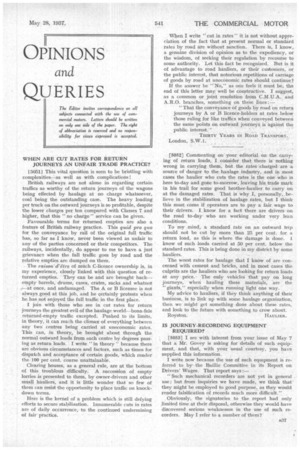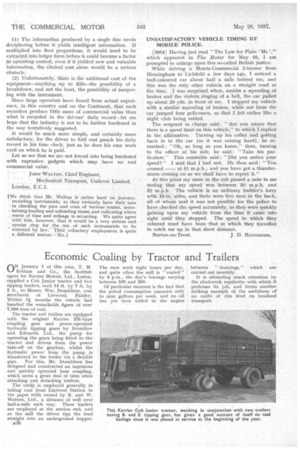OPINIONS
Page 51

Page 52

If you've noticed an error in this article please click here to report it so we can fix it.
and
QUERIES
WHEN ARE CUT RATES FOR RETURN JOURNEYS AN UNFAIR TRADE PRACTICE?
[5051] This vital question is seen to be bristling with complexities—as well as with complications 1
British railways are not alone in regarding certain traffics as worthy of the return journeys of the wagons being effected by haulage at no charge whatsoever, coal being the outstanding case. The heavy loading per truck on the outward journeys is so profitable, despite the lower charges per ton compared with Classes 7 and higher, that this "no charge" service can be given.
Favourable terms for returned empties are also a feature of British railway practice. This quid pro quo for the conveyance by rail of the original full traffic has, so far as I know, never been viewed as unfair to any of the parties concerned or their competitors. The railways, incidentally, do appear to me to have a just grievance when the full traffic goes by road and the relative empties are dumped on them.
. The raison'd'Atre of much C-licence ownership is, in my experience, closely linked with this question of returned empties. They can be and are brought back— empty barrels, drums, cases, crates, sacks and whatnot —at once, and undamaged. The A or B licensee is not always good at this job, and he certainly protests when he has not enjoyed the full traffic in the first place.
I join with those who see in cut rates for return journeys the greatest evil of the haulage world--bona-fide returned-empty traffic excepted. Pushed to its limits, in theory, it can reach the climax of everything between any two centres being carried at uneconomic rates. This can, in theory, be brought about through the normal outward loads from each centre by degrees passing as return loads. I write "in theory" because there are obvious circumstances and factors, such as times for dispatch and acceptance of certain goods, which render the 100 per cent, course unattainable.
Clearing houses, as a general rule, are at the bottom of this troublous difficulty. A succession of empty lorries is presented to them, by owner-drivers and other sniall hauliers, and it is little wonder that so few of them can resist the opportunity to place traffic on knockdown terms.
Here is the kernel of a problem which is still defying efforts to secure stabilization. Innumerable cuts in rates are of daily occurrence, to the continued undermining of fair practice. When I write "cut in rates" it is not without appreciation of the fact that at present normal or standard rates by road are without sanction. There is, I know, a genuine division of opinion as to the expediency, or the wisdom, of seeking their regulation by recourse to some authority. Let this fact be recognized. But is it of advantage to road hauliers, or their customers, or the public interest, that notorious repetitions of carriage of goods by road at uneconomic rates should continue?
If the answer be "No," as one feels it must be, the end of this letter may, well be constructive. I suggest, as a common or joint resolution from C.M.U.A. and A.R.O. branches, something on these lines:— " That the conveyance of goods by road on return journeys by A or B licence-holders at rates _below those ruling for like traffics when conveyed between the same points on outward journeys is' against the public interest."
THIRTY YEARS IN kOAD. TRANSPORT. London, S.YV.1.
[5052] Commenting on your editorial on the carrying of return loads, I consider that there is nothing wrong in carrying them, but the rates 'charged .are a, source of danger to the. haulage industry, and in most cases the haulier who cuts the rates is the one who is here to-day and gone to-morrow, leaving his trade mark in his trail for some good brother-haulier to carry on at the damaged rates. That is why I, personally,. believe in the stabilization of haulage rates, but I think this must come if operators are to pay a fair, wage to their drivers. I know for a fact there are drivers on the road to-day who are working under very lean conditions.
To my mind, a standard rate on an outward trip should not be cut by more than 25 per cent. for a return load, as this is where the damage is done. I know of such loads carried at 50 per cent, below the standard rates. This is being done in my district by some hauliers.
The worst rates for haulage that I know of are concerned with cement and bricks, and in most cases the culprits are the hauliers who are looking for return loads at any price.' The only vehicles that pay on long journeys, when hauling these materials, are the " giants," especially when running light one way.
My advice to hauliers, if they think anything of their, business, is to link up with some haulage organization, then we might get something done about these rates, and look to the future with something to crow about.
Royston. HAULIER.
IS JOURNEY-RECORDING EQUIPMENT REQUIRED?
[5053] I see with interest from your issue of May 7 that a M.r. Govey is asking for details of such equipment, and that, with your usual Courtesy, you have supplied this information.
I write now because the use of such equipment is referred to by the Baillie Committee in its Report on Drivers' Wages, That report says :— " Such mechanical recorders are not yet in general use: but from inquiries we have made, we think that they might be employed to good purpose, as they Would render falsification of records much more difficult."
Obviously, the signatories to the report had only limited time at their disposal, otherwise they would have discovered serious weaknesses in the use of such recorders. May I refer to a number of them? (1) The information produced by a single disc needs deciphering before it yields intelligent information. If multiplied into fleet proportions, it would need to be extracted into ledger form before it could become a factor in operating control, even if it yielded new and valuable information, the clerical cost .alone would be a serious obstacle.
(2) Unfortunately, there iS the additional Lost of the equipment—anything tip to 220—the possibility of a, breakdown, and not the least, the possibility of tampering with the instrument.
Since large operators have found from actual experience,. in this country and on the Continent, that such recorders produce little more of commercial value than what is recorded in the drivers' daily record—let me
hope that the industry is not to be further burdened in the way tentatively suggested.
It would be much more simple, and certainly more satisfactory, for the driver to fold and punch his daily
record in his time clock, just as he does his ow_n work card on which he is paid.
Let us see that we are not forced into being burdened with expensive gadgets which may • have no real commercial value.
JOHN WALTON, Chief Engineer,
Mechanical Transport, Unilever Limited. London, E.C.I.
[We think that Mr.. Walton is rather hard on journey recording instruments, as they Certainly have their uses in checking the pros and cons of various routes, ascertaining loading and unloading times, and indicating where waste of time and mileage is occurring. We quite agree with -him, however, that it would be a very serious and unwise step for the use . of such instruments to be ' enforced by law.' Their voluntary employment is quite a_ different matter.-1-ED.]
UNSATISFACTORY VEHICLE TIMING BY MOBILE POLICE.
[5054] Having just read "The Law for Pain 'Mr.'," which appeared in The Motor for May 18, I am prompted to enlarge upon this so-called British justice.
While driving a Morris-Commercial 2-tonner from Birmingham to Lichfield a few days ago, I noticed a buff-Coloured car about half 'a mile behind me, and this was the only other vehicle on a straight road at the time. , I was surprised when, amidst a squealing .pt brakes and. the violent ringing of a hell, the car pulled up about 20 yds. in front of me. I stopped my vehicle with a similar squealing of brakes, while out from the car jumped four policemen, so that I felt rather like a night club being raided.
The sergeant in charge said : " Are you aware that there is a speed limit on this vehicle," to which I replied in the affirmative. Turning up his collar and getting back in to the car (as it was raining hard), he remarked : "Oh, so long as you know," then, turning to the officer at his side, he said : " Take his particulars." This constable said: "Did you notice your speed?" I said that I had not. He then said : "You crossed at 51 m.p.h., and you have got a thunderstorm corning on as we shall have to report it."
At this point my mate in the cab passed a note to me stating that my'speed was between 30 m.p.h. and 32 m.p.h. The vehicle is an ordinary builder's lorry with 18-in, sides, and there were five men in the back, all of whom said it was not possible for the police to have checked the speed accurately, as they were quickly gaining upon my vehicle from the time it cane into sight until they stopped. The speed to which they referred must have been that at which they travelled to catch me Up in that short distance.
Burton-on-Trent. J. D. BANNISTER,




























































































